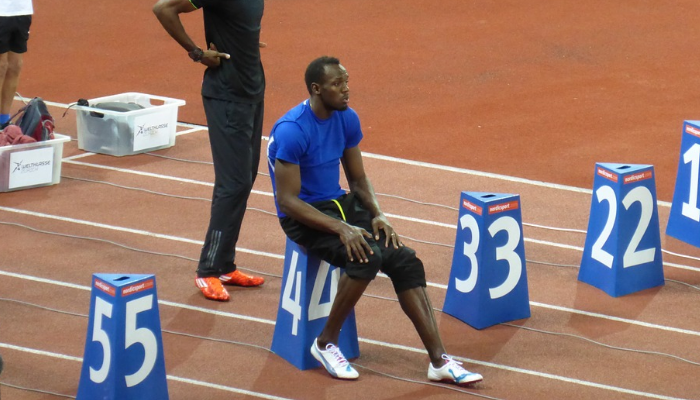Before you read this post, what do you think is more important, talent or hard work? Here’s what I believe.
During the Olympic Games Rio 2016, I saw a lot of talent.
Usain Bolt sprinted past the field for three gold medals that add up to nine total. The Jamaican sprinter made it clear he’s the greatest track and field athlete ever—some say the greatest athlete across all sports.
Simone Biles put together a masterful performance in the gymnastics arena winning four gold medals plus a bronze medal. She cemented her status for many as the best gymnast in the history of the sport.
And, considered the greatest Olympian of all time, Michael Phelps also put on a show in Rio. For his final Olympic outing, he added five gold medals and one silver medal to make a record total of 23 gold medals.
Every athlete who competed in the Rio Olympics possessed an enormous amount of talent. And not only talent, they also put in a ton of hard work to get there.
If these athletes lacked either talent or hard work, then they would be on the couch watching like you and me.
And since I’m a heavy thinker, thinking about the Olympics led me to ask myself: Which is more important, talent or hard work?
[activecampaign form=3]
Investigating Talent
Let’s first analyze talent.
Natural, God-given talent is a beautiful thing. It looks so pretty and graceful when those with it show it off in the classroom, on the field, or in the workplace. The lack of struggle and superior performance is mesmerizing to the human eye.
Yet, on the inside, talent can deceive the mind. Talent spreads lies that you’re already better than your peers without trying hard, so you can relax and take it easy.
When you see your classmates study 15 hours for the Chemistry exam to get a C grade and you study two hours to get an A grade, it changes your hungry mentality. And when you know you don’t have to prepare in advance to speak in front of an audience because you can rock the stage based on your natural instincts, you don’t spend the extra hours preparing.
The message becomes why work so hard when you don’t have to. And everything goes smooth in the beginning with talent, so you don’t see the looming problem.
However, difficulties come over time when you don’t put in hard work to improve your talent. The competition gets better through hard work and time. And you’re staying the same or getting worse because you’re not putting in much effort.
So, in my opinion, talent’s greatest strength—the ability to be naturally better than your peers—leads to talent’s greatest weakness—tricking the mind that you don’t need to work hard.
In the end, the cream rises to the top and the talented don’t rise with it because they didn’t improve their skills.
And going back to our Olympics example, there were definitely some athletes who had the talent to reach the Olympics but missed out. They didn’t put in as much work to get there, so they wasted their potential.
Now it’s time to analyze hard work.
Investigating Hard Work
Hard work looks at the process differently. It recognizes it doesn’t have all the natural talent in the world. So it knows for a fact that it needs to hustle on a regular basis.
This self-awareness and willpower to make up for inadequacies with hard work becomes the reason hard workers achieve massive success. Their limitations of talent produce the drive to never become lazy or quit. It’s a self-propelling engine that keeps on churning as they get better and smarter.
And they don’t have to face the temptation of knowing they can get by without working hard, unlike the naturally talented. This different mindset allows them to focus on what matters and have breakthroughs.
Because their mindset is different and thoughts influence actions, I’d take the hard worker over the naturally talented person any day of the week.
The hard worker is only going to get better, more efficient, smarter, and stronger. The talented person is only going to get lazier, rely more on their talent, and stay the same or get worse.
It’s just a matter of time when the hard worker surpasses the more talented—it’s going to happen.
That’s why I’m convinced that hard work is more important than talent.
The Perfect Combination: Talent + Hard Work

We discovered that the winner is tireless hard work.
However, the perfect combination, one step ahead of the winning combination, is when you put together your talent and hard work. Then you make strides that other people can’t comprehend.
It’s for this reason that Kobe Bryant became one of the best players in the history of basketball, when other players with similar talent are forgotten. Kobe came into the NBA out of high school with high potential. But he didn’t rest on his talent and do just enough to get by.
He put in the hours each day to work like he didn’t have much NBA talent. Waking up before the sun rises to get extra shots in by himself, watching game film, and lifting weights when his teammates were relaxing, made all of the difference.
And the rest is history as his talent and hard work led him to five championships.
How To Utilize It
You don’t want to waste your potential. And neither do I. So how do we make sure we get the most out of our lives while we have the chance?
As I said above, it comes down to combining your talent with hard work. When you get these two opposites to come together for the sake of the team, the opportunities are endless.
Here are some action steps to do this:
1. Discover your talent
Because every human is unique, you’re going to gravitate to certain activities over others. Some people prefer art, others prefer music, some can’t stand either and prefer building things, and so on.
Your talent is what activity you move toward that you’re naturally good at or naturally enjoy doing. These two often go hand in hand because if you enjoy it, you’ll practice it more to get better. And if you’re good at it, you’ll often enjoy your success and stay with it.
Makes sense, right? So the first step has to be identifying your talent.
And you could know your talent before the age of 10, like Beyonce, or you could identify it later in life like KFC’s Colonel Sanders who didn’t become a chef until he hit age 40. Keep looking until you find it, it’s never too late.
2. Define your direction
Once you know your talent, it’s time to define your direction. Where do you want to go with it? What’s your ultimate goal?
Knowing this will be your North Star that guides you from the start, before you get lost in the day-to-day work and don’t know the purpose of all of your work.
Do you want to be CEO of a Fortune 500 company? Do you want to be a head coach? Do you want to invent a new technology? Do you want to start a nonprofit that shelters the homeless?
It also helps to know why you want to go a certain direction. Get a clear why and you’ll stay motivated because you can rely on it in times of hardship.
3. Start making progress
Enough thinking and reflecting, now you need to make the first move to get started. So keep your direction in the back of your mind, and put making progress each day in the front of your mind.
What’s the first move? Do it. What’s the next move? Do it. When you continue to make progress, you’ll build momentum as you get smarter and better at what you’re doing.
A productivity and dream killer is to wonder how you’re going to climb the mountain from the start. Suddenly you won’t be motivated and you’ll be paralyzed. Don’t do that.
Do take action to win each day. And eventually you’ll have a chance to reach your goal, the mountain will be in closing distance. If you don’t win each day, you will never get close.
4. Work hard
After the excitement of the goal and the new start wears off, there are going to be days where your work is tiresome and working is the last thing you want to do.
It’s at this time that the best separate themselves by continuing to practice. Those who don’t work hard take a few days off, get lazy, or quit altogether.
Working hard is the fourth step, but it’s the most important from my perspective. Because you have to work hard if you want to be great. I’m sorry that there’s no other way.
Anyone you admire worked their butt off to get to where they are.
From Elon Musk and Bill Gates, to Michael Jordan and Jerry Rice, and your favorite musicians and actors, they all got to where they are by hard work over time.
5. Stick with it
Working hard for a month or a year is one thing. But sticking with your hard work for years and decades is where you separate yourself from the pack and experience unbelievable results.
Imagine spending 10 years focusing and improving on what you do. That’s 3,650 days compounding together to help you reach your potential.
You can call it the 10,000 hour rule or whatever you want, the truth is you’ll become an expert in your field with this dedication.
Once you get older and advance further in a career, it becomes obvious that hard work is more important than talent. So stick with your hard work and you won’t live with the regret that you could have been a better version of yourself.
Getting the most out of your potential is the recipe for a satisfied life. So work hard, baby.
How do you feel about talent and hard work? What examples from your life prove that talent or hard work mattered more?
Want to read more about success? Read Success And Failure Go Hand In Hand.
[activecampaign form=3]




